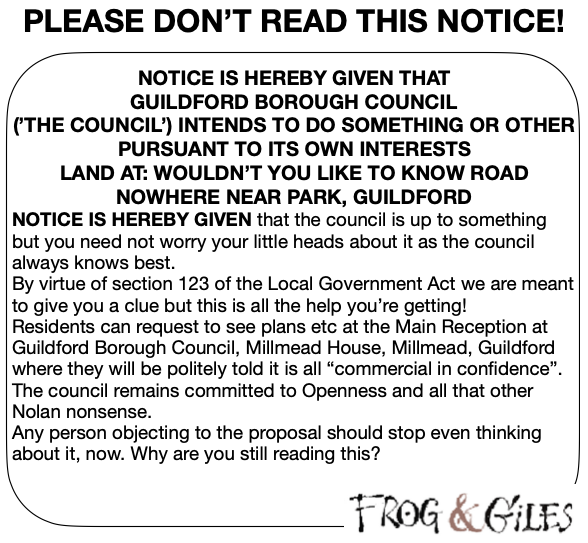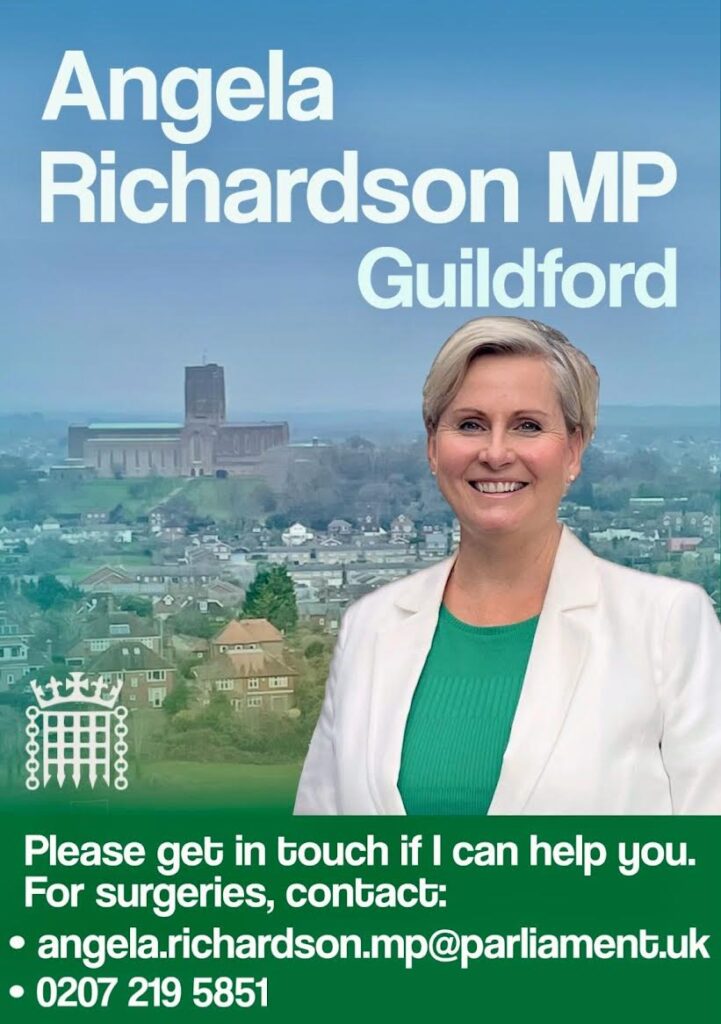 Abraham Lincoln
If given the truth, the people can be depended upon to meet any national crisis...
Abraham Lincoln
If given the truth, the people can be depended upon to meet any national crisis...
 Guildford news...
for Guildford people, brought to you by Guildford reporters - Guildford's own news service
Guildford news...
for Guildford people, brought to you by Guildford reporters - Guildford's own news service
Letter: Why Can’t Council Reveal Property Acquisition Information?
Published on: 18 Oct, 2018
Updated on: 18 Oct, 2018
In response to: Council Acquires Bedford Wharf Properties to Allow Part of Guildford’s ‘Transformation’
Regarding the GBC property acquisitions at Bedford Wharf, there would seem to be a couple of common sense observations:
1) Most new property transactions must be registered at the Land Registry. Stamp Duty Land Tax must be paid on all transactions over a certain figure. Is GBC somehow exempt from these disclosures for these transactions? If it isn’t exempt then the figure will be publicly disclosed in any case. So why not tell the public rather than oblige it to go to the Land Registry?
2) If it was a term of the sale and purchase agreement then surely any government agency like GBC would have a clause stating that it reserves the right to disclose salient details in accordance with Freedom of Information Requests?
If there are genuine reasons why GBC cannot disclose the information then surely it could explain what they are? Or is this another case of not wanting to inform the “bloody rabble”?
Responses to Letter: Why Can’t Council Reveal Property Acquisition Information?
Leave a Comment Cancel replyPlease see our comments policy. All comments are moderated and may take time to appear.

See Dragon story: GBC’s Explanation of Major Land Sale Notice Error ‘Borders on Arrogant’ Says Councillor







Recent Articles
- Latest Figures Show Two in Every Three Burglaries Went Unattended in Surrey
- Dragon Interview: The Thriller Writer Who is a Climate Change Ambassador
- Notice: Guildford Twinning Association Filmfest 2024
- Zero Re-opens Uptown
- Letter: I Hope the New CEO Will Reflect on the Constructive Advice
- Campaign to Encourage Visitors to the Surrey Hills To Go by Train
- Police Commissioner Office Ordered to Remove Social Media Messages
- Police and Crime Commissioner Candidate Interview – Kate Chinn
- Guide to Telephone Befriending Services for Older People
- Stage Dragon: Sleuth at the Yvonne Arnaud Theatre


Recent Comments
- H Trevor Jones on Campaign to Encourage Visitors to the Surrey Hills To Go by Train
- Patrick Streeter on National Trust’s Plans For Clandon Park: ‘A Great House Laid Bare’
- Angela Richardson on Guildford’s MP Joins Objectors to the Development of Protected University of Law Site
- Georgina Grant on Campaign to Encourage Visitors to the Surrey Hills To Go by Train
- Olly Azad on Letter: I Hope the New CEO Will Reflect on the Constructive Advice
- Martin Davies on Guildford’s MP Joins Objectors to the Development of Protected University of Law Site
Search in Site
Media Gallery
Dragon Interview: Local Artist Leaves Her Mark At One of England’s Most Historic Buildings
January 21, 2023 / No Comment / Read MoreDragon Interview: Lib Dem Planning Chair: ‘Current Policy Doesn’t Work for Local People’
January 19, 2023 / No Comment / Read MoreA3 Tunnel in Guildford ‘Necessary’ for New Homes, Says Guildford’s MP
January 10, 2023 / No Comment / Read More‘Madness’ for London Road Scheme to Go Ahead Against ‘Huge Opposition’, Says SCC Leader
January 6, 2023 / No Comment / Read MoreCouncillor’s Son Starts Campaign for More Consultation on North Street Plan
December 30, 2022 / No Comment / Read MoreCounty Council Climbs Down Over London Road Works – Further ‘Engagement’ Period Announced
December 14, 2022 / No Comment / Read MoreDragon Interview: GBC Reaction to the Government’s Expected Decision to Relax Housing Targets
December 7, 2022 / No Comment / Read MoreHow Can Our Town Centre Businesses Recover? Watch the Shop Front Debate
May 18, 2020 / No Comment / Read More







RWL Davies
October 18, 2018 at 3:21 pm
Local councils and many other public bodies often cite “commercial confidentiality” as a reason for refusing disclosure of detail.
This in order for private concerns, for the most part, be they Dave’s Motors of Albert Square, or pan-global giants like Anything-u-Want, because substantial amounts of public money are rarely at major risk in the private sector.
For bodies totally funded by taxation, as opposed to private capital, e.g. local councils, the exact opposite applies; it’s public money so non-disclosure is not applicable.
Then again, private sector concerns may have much to learn from the business acumen and deal-making capabilities of local councils.
Helena Townsend
October 18, 2018 at 5:12 pm
I imagine they want to keep this confidential to avoid the “bloody rabble” endlessly criticising every move. Even if GBC had acquired the site for fifty pounds people would complain – I say, people, what I mean is the usual few.
John Perkins
October 19, 2018 at 10:27 am
Even if the site had been bought for 50 pence, it would still be money belonging to people generally and not to GBC.
We have a right to know how our money is spent and there is no reason to insult them for wanting to know.
Ben Paton
October 20, 2018 at 10:13 am
Paranoia is a justification for secrecy then?
The Dragon reports that those it consulted were in favour of the acquisition. That included “the usual few”.
RWL Davies
October 18, 2018 at 6:09 pm
Many public bodies cite “commercial confidentiality” as a reason for refusing disclosure on their dealings with other parties; local councils are particularly prominent in this regard.
Citing commercial confidentiality is reasonable where private money, i.e. not public money raised by taxation, is the sole source of funding and no public bodies hold any risk in the venture being funded.
In all other cases public bodies should not use “commercial confidentiality” as a reason for non-disclosure, as they use public money and take on risk in the venture funded.
They should, as a matter of course, provide full disclosure.
This needs to be tested in law.
Perhaps the private sector has much to learn from the commercial acumen of local authorities?
Then again have look at central Guildford.
Martin Elliott
October 22, 2018 at 4:54 pm
As with your previous comment, it’s public money for public services. It doesn’t matter if the source is taxation (council tax, business rates, hidden government loan – not a direct government grant anymore) or fees for services, car park charges, etc. It’s money being used on our behalf.
As hinted above, with the changes in funding methods, that I don’t remember voting for in general or detail, somebody has decided the best way to raise revenue is by property investment. From previous cycles of local government economics, I don’t remember any great commercial acumen. They weren’t too good on banking either.
I have no doubt some councillors bring expertise from their other life, but a council borrowing £100 millions from NGOs needs to pay for expert, full-time officers.
But how can we know if the council and its officers are performing adequately or better if we don’t know, for example, even basic return on an investment? It’s not even that. The press release doesn’t even say what they’ve “secured”.
The council has owned the Old Orleans freehold for over five years, according to the Local Plan, but not, it would seem, the lease.
I would ask GBC to please show a bit of respect for residents and clear the “smoke and mirrors”.
Adam Aaronson
October 20, 2018 at 11:37 pm
Most people who pay over the odds for a property prefer to keep the price confidential.